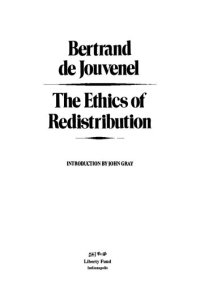
Ebook: Ethics of Redistribution
Author: Bertrand de Jouvenel
- Year: 1990
- Publisher: Liberty Fund
- City: Indianapolis
- Language: English
- pdf
In this concise and elegant work, first published in 1952, Bertrand de Jouvenel purposely ignores the economic evidence that redistributional efforts sap incentives and are economically destructive. Rather, he stresses the commonly disregarded ethical arguments showing that redistribution is ethically indefensible for, and practically unworkable in, a complex society.
The Ethics of Redistribution contains two lectures delivered at Cambridge University in 1949. The author, Bertrand de Jouvenel, analyzes income redistribution from an ethical viewpoint. He asks whether redistribution of income is good and desirable.
Redistribution, of course, is related to socialism. But as Jouvenel argues, socialism wasn’t supposed to be about redistribution… but about establishing a new social order without upsetting the class structure. This was supposed to be achieved by the abolition of private property.
In practice, however, especially after the failure of societies based on state property, socialists tried to reach their goal by redistributing incomes.
Jouvenel distinguishes two sorts of redistribution: the sort that aims to help the poor and the sort that aims to equalize incomes. The latter is what he calls "pure redistribution." He considers helping the poor, either through private or public means, "inherent to the very notion of society." What he questions from an ethical viewpoint is pure redistribution — redistribution for the sake of getting a more equal redistribution of income.
Which is why this book is relevant to the current debates on inequality of income and wealth.
The Ethics of Redistribution contains two lectures delivered at Cambridge University in 1949. The author, Bertrand de Jouvenel, analyzes income redistribution from an ethical viewpoint. He asks whether redistribution of income is good and desirable.
Redistribution, of course, is related to socialism. But as Jouvenel argues, socialism wasn’t supposed to be about redistribution… but about establishing a new social order without upsetting the class structure. This was supposed to be achieved by the abolition of private property.
In practice, however, especially after the failure of societies based on state property, socialists tried to reach their goal by redistributing incomes.
Jouvenel distinguishes two sorts of redistribution: the sort that aims to help the poor and the sort that aims to equalize incomes. The latter is what he calls "pure redistribution." He considers helping the poor, either through private or public means, "inherent to the very notion of society." What he questions from an ethical viewpoint is pure redistribution — redistribution for the sake of getting a more equal redistribution of income.
Which is why this book is relevant to the current debates on inequality of income and wealth.
Download the book Ethics of Redistribution for free or read online
Continue reading on any device:

Last viewed books
Related books
{related-news}
Comments (0)